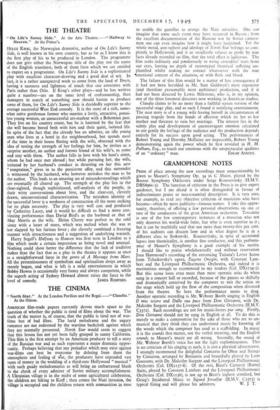THE CINEMA
AMERICAN film-trade papers currently devote much space to the question of whether the public is tired of films about the war. The truth of the matter is, of course, that the public is tired not of war- films but of bad films. The lurid melodrama and the sugary romance are not redeemed by the wartime backcloth against which they are normally presented. North Star would seem to suggest that this lesson has not yet been fully grasped in sunny California. This film is the first attempt by an American producer to tell a story of the Russian war and as such represents a major dramatic oppor- tunity. Perhaps believing that any prejudice which may exist against war-films can best be overcome by deleting from them the atmosphere and feeling of War, the producers have expended vast sums of money in the wedding of a third-rate Hollywood " musical " with such gaudy melodramatics as will bring an embarrassed blush to the cheek of every admirer of Soviet military accomplishment. A Ukrainian village is in the midst of some agricultural celebration, the children are hiking to Kieff • then comes the Nazi invasion, the village is occupied and the children return with ammunition in time
to enable the guerillas to avenge the Nazi atrocities. One can imagine that some such event may have occurred in Russia ; from the excellent documentation of the Russian war by Soviet camera- men one can even imagine how it might have happened. Yet the whole mood, atm3sphere and ideology of North Star belongs so com- pletely to Hollywood, and it so steadfastly refuses to profit by true facts already recorded on film, that the total effect is ludicrous. The film seeks tediously and ponderously to wring crocodiles' tears from our eyes, leaving no depth of stereotyped theatrical suffering un- plumbed whilst making no contact whatsoever with the une "emotional content of the situation, or with flesh and blood.
The failure of this film would be a matter of less consequence if it had not been heralded as Mr. Sam Goldwyn's most expensive (and therefore presumably most ambitious) production, and if it had not been directed by Lewis Milestone, who is, in my opinion, one of the three foremost directors now working in American studios.
Claudia claims to be no more than a faithful screen version of the successful stage play, and as such I found it satisfying entertainment. The neat story is of a young wife freeing herself in circumstances of passing tragedy from the bonds of affection which tie her to her mother and threaten to ruin her marriage. The interest lies in the subtle play and development of unextravagant emotion calculated to stir gently the feelings of the audience and the production depends entirely for its success upon good acting. The performances of Robert Young and Dorothy McGuire are impeccable, Robert Young demonstrating again the power which he first revealed in H. M. Pulham, Esq., to touch our emotions with the unspectacular qualities


























 Previous page
Previous page